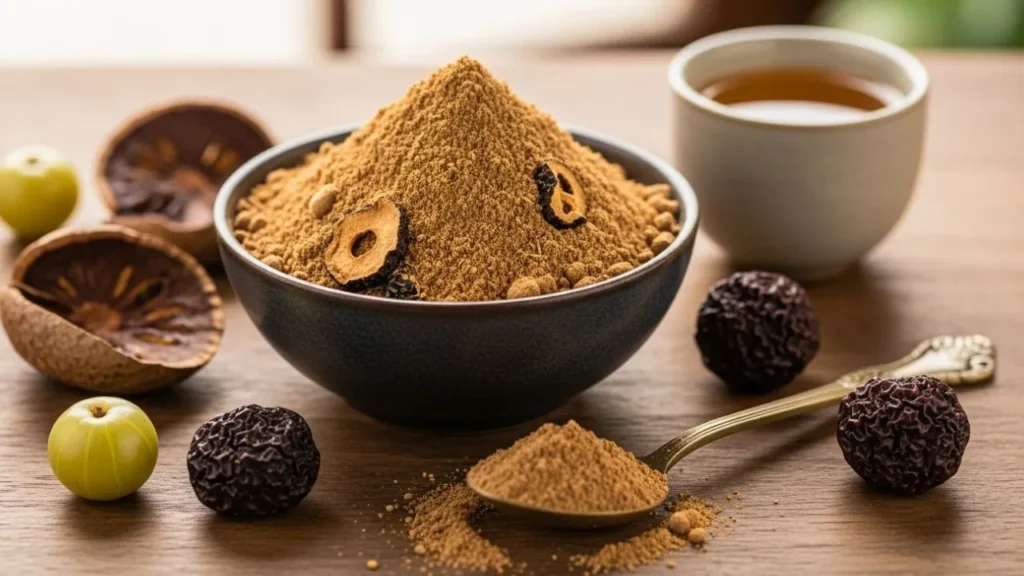Ayurveda, the ancient Indian system of medicine dating back over 5,000 years, emphasizes balance in the body, mind, and spirit for optimal health. In Ayurveda, digestion is considered the cornerstone of well-being, governed by “Agni” or digestive fire. When Agni is strong, it efficiently processes food, absorbs nutrients, and eliminates waste, preventing issues like bloating, constipation, indigestion, and gas. However, factors such as stress, poor diet, and lifestyle imbalances can weaken Agni, leading to digestive disorders.
Ayurvedic herbs offer natural, holistic remedies to kindle Agni, soothe the gut, and promote overall digestive health. These herbs are often used in teas, powders, or supplements and have been supported by both traditional wisdom and modern research for their anti-inflammatory, antioxidant, and carminative properties. This article explores eight powerful Ayurvedic herbs for digestion, detailing their benefits, uses, precautions, and where to purchase them via Amazon (note: these may include affiliate links; as an Amazon Associate, I earn from qualifying purchases).
1. Triphala

Triphala, a classic Ayurvedic formula, is a blend of three fruits: Amalaki (Indian gooseberry), Bibhitaki (Belleric myrobalan), and Haritaki (Chebulic myrobalan). It’s renowned for its gentle detoxifying effects and ability to support digestive regularity without causing dependency.
Benefits for Digestion: Triphala promotes bowel regularity, alleviates constipation, and enhances nutrient absorption by cleansing the colon and balancing the doshas (Vata, Pitta, Kapha). It may also reduce inflammation in the gut, improve gut microbiome health, and help manage conditions like IBS. Studies suggest it can lower serum cholesterol and support liver function, indirectly aiding digestion.
How to Use: Take 1/2 to 1 teaspoon of Triphala powder mixed in warm water before bed. It can also be consumed as capsules or tea. Start with a small dose to assess tolerance.
Precautions: Avoid during pregnancy or if you have diarrhea. Consult a doctor if you have chronic conditions, as it may interact with medications.
Purchase on Amazon: Banyan Botanicals Triphala Powder – Organic
2. Ginger (Adrak)

Ginger is a warming spice widely used in Ayurveda to stimulate digestion and combat nausea.
Benefits for Digestion: It enhances Agni by stimulating digestive enzymes, reducing bloating, gas, and indigestion. Ginger’s antioxidants help rehydrate the body and replenish nutrients lost during digestive upset. Research shows it can alleviate motion sickness, morning sickness, and post-operative nausea, making it effective for overall gut motility.
How to Use: Brew fresh ginger tea by grating 1-inch root into hot water, or take 500-1,000 mg capsules daily. Add to meals for flavor and digestive support.
Precautions: High doses may cause heartburn in Pitta-dominant individuals. Not recommended for those with gallstones or bleeding disorders.
Purchase on Amazon: Nature’s Way Ginger Root Capsules
3. Fennel (Saunf)

Fennel seeds are a cooling carminative herb that soothes the digestive tract and freshens breath.
Benefits for Digestion: Fennel aids in relieving bloating, cramps, and flatulence by relaxing gastrointestinal muscles and promoting enzyme secretion. It’s part of the CCF (Cumin-Coriander-Fennel) tea blend, which supports detoxification and reduces acidity.
How to Use: Chew 1/2 teaspoon of seeds after meals, or steep in hot water for tea. Capsules are available for convenience.
Precautions: Safe for most, but avoid large amounts during pregnancy due to its estrogenic effects.
Purchase on Amazon: Eastanbul Fennel Seed
4. Cumin (Jeera)
Cumin is a staple spice in Ayurvedic cooking, known for its ability to enhance flavor while boosting digestion.
Benefits for Digestion: It stimulates digestive juices, reduces gas, and improves nutrient absorption. Cumin water can accelerate digestion and fight gut issues like indigestion. Its antimicrobial properties may help prevent infections in the gut.
How to Use: Roast and grind seeds for cooking, or drink cumin tea (1 tsp seeds in boiling water). Supplements offer concentrated benefits.
Precautions: May cause allergic reactions in some; use moderately if prone to acidity.
Purchase on Amazon: Cumin Seed Capsules
5. Turmeric (Haldi)
Turmeric, with its active compound curcumin, is a potent anti-inflammatory herb in Ayurveda.
Benefits for Digestion: It soothes the gut lining, reduces bloating, and supports liver function for better bile production. Turmeric can alleviate symptoms of IBS and promote healing in the digestive tract due to its antioxidant effects.
How to Use: Add to golden milk (turmeric with milk and black pepper), or take 500 mg capsules. Black pepper enhances absorption.
Precautions: High doses may interact with blood thinners; avoid if you have gallbladder issues.
Purchase on Amazon: BASIC AYURVEDA Turmeric Curcuma Supplement
6. Ajwain (Carom Seeds)
Ajwain is a pungent seed used in Ayurveda for its strong digestive properties.
Benefits for Digestion: It relieves indigestion, acidity, and flatulence by promoting gastric juice secretion and reducing spasms. Ajwain is rich in thymol, which has antispasmodic and carminative effects.
How to Use: Chew seeds directly, or make ajwain water by boiling 1 tsp in water. Use in cooking for added benefits.
Precautions: Not suitable for pregnant women or those with hyperacidity.
Purchase on Amazon: Ajwain Seeds
7. Licorice (Mulethi)
Licorice root is a demulcent herb that coats and soothes the digestive tract.
Benefits for Digestion: It reduces acid reflux, ulcers, and inflammation while promoting mucus production for gut protection. Deglycyrrhizinated licorice (DGL) is particularly effective for heartburn without raising blood pressure.
How to Use: Chew root sticks, or take DGL chewables before meals. Tea form is also common.
Precautions: Avoid standard licorice if you have high blood pressure; opt for DGL. Not for long-term use.
Purchase on Amazon: Natural Factors Chewable DGL
8. Peppermint (Pudina)
Peppermint is a cooling herb that relaxes the digestive muscles.
Benefits for Digestion: It eases IBS symptoms, reduces spasms, and alleviates bloating and nausea. Enteric-coated peppermint oil is effective for targeted relief in the intestines.
How to Use: Drink peppermint tea, or take enteric-coated capsules (200-400 mg) with meals.
Precautions: May worsen acid reflux in some; avoid if you have GERD.
Purchase on Amazon: IBgard Peppermint Oil Capsules
Conclusion
Incorporating these Ayurvedic herbs into your routine can naturally enhance digestion, but they work best alongside a balanced diet, mindful eating, and lifestyle practices like yoga and adequate sleep. Always consult an Ayurvedic practitioner or healthcare provider before starting new supplements, especially if pregnant, nursing, or on medications. Individual results vary based on your unique constitution (Prakriti). For more personalized advice, explore reputable Ayurvedic resources. Start small, listen to your body, and enjoy the path to better gut health!
Disclaimer: The information provided in this article is for educational purposes only and is not intended to diagnose, treat, cure, or prevent any disease. Always consult a qualified healthcare professional or Ayurvedic practitioner before starting any new supplement or herbal regimen, especially if you are pregnant, nursing, have a medical condition, or are taking medications.

